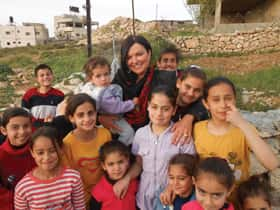“May the world go from mines to vines.” —Heidi Kuhn
 Following the tragic death of Princess Diana in 1997 and inspired and motivated by the royal’s commitment to the global ban on land mines, concerned philanthropist Heidi Kuhn founded the San Rafael organization Roots of Peace (ROP).
Following the tragic death of Princess Diana in 1997 and inspired and motivated by the royal’s commitment to the global ban on land mines, concerned philanthropist Heidi Kuhn founded the San Rafael organization Roots of Peace (ROP).As a fifth-generation resident of the San Francisco Bay Area, Kuhn has a deep respect for the preservation of land. When she became aware of the effect of land mines (not removed after war or civil conflict) on human life, the environment and economy, she was inspired to help turn mine fields into bountiful vineyards worldwide.
At a reception at her family home, where friends and dignitaries from around the world were gathered, Kuhn made a toast, “May the world go from mines to vines.” Those gathered encouraged Kuhn to take the idea out of her living room and into the world. Thus, the Mines to Vines vision to transform mine fields around the world into agricultural fields was born.
Prior to her work on this issue, Kuhn owned her own television news organization, NewsLink International, reporting for CNN and other organizations on the Exxon Valdez oil spill and the melting of the ice curtain between the United States and the Soviet Union. Raising her children in Juneau, Alaska, she earned a reputation for bridging borders for peace—reporting for ABC, CBS, NBC, CNN, Nippon Television and other major media organizations. A cancer survivor, she views the issue of land mines as a curable disease. Her media and personal experience gave her the background and contacts to move forward.
Turning ideas into reality, Kuhn sought the support of Napa Valley Vintners to replace the scourge of land mines in war-torn countries with the nectar of grapes, raisins or a bottle of wine. Seeking to transform “seeds of terror” into “seeds of hope,” she attracted the support of legendary vintners such as Robert Mondavi, Miljenko “Mike” Grgich, Diane Disney Miller and more than 400 other California vintners.
Kuhn is proud to be working in places like Vietnam, Afghanistan, Israel and Palestine’s West Bank. She’s particularly satisfied and proud that she convinced the governments of Israel and Palestine to agree to clear the land mines in Bethlehem in May 2013. “It was a miracle to get Israel and Palestine to talk together. I approached them with the heart of a mother because all world leaders have mothers,” she says. For Kuhn, it’s all about making the world safer for children, as well as restoring human dignity. Removing a land mine and replacing it with a grape vine, to Kuhn, is a humble expression of peace on Earth.
One can grasp the importance of her work when she talks about Vietnam, where there remain 3.5 million buried land mines 40 years after the end of the war. Thanks to the organization’s work, today there are 2,000 ROP farmers growing high-quality, fresh black pepper there. In Northern California, Williams-Sonoma is packaging and selling Roots of Peace pepper. Although there are still active land mines in 70 countries, the success of ROP programs in places like Vietnam helps Kuhn remain positive about the mission and inspires her to keep working, one country at a time, until they’re all removed.
In Afghanistan, which has farming communities with rich soil, Roots of Peace made the ground safe and economically productive, which impacted 1 million farmers and their families. After decades of war, the economy was broken and many people had been displaced. A good portion of the available land had gone years without cultivation. To address this, Roots of Peace provided a comprehensive package of farming resources, like seedlings, fertilizer and other tools needed for success.
Every year, landmines kill 15,000 to 20,000 people—most of them children, women and the elderly—and severely maim countless more. In times of relative peace, the process of mine removal is referred to as demining. The main methods used for humanitarian demining on land are manual detection using metal detectors and prodders. According to Kuhn, once the land mines are detected, they’re blown up.
Roots of Peace also trains farmers to dramatically increase the yield of their crops using traditional, indigenous solutions that incorporate new innovations. In many cases, farmers have doubled and even tripled their yearly income, giving them the means to expand their business and educate their children.
Kuhn hopes to ignite the spirit of women across the globe to support programs like Roots of Peace. It’s hard to imagine a child chasing a ball or a butterfly and then losing a limb because of an undetected mine without wanting to do something to stop “a mother’s worst nightmare.”
“Demine, replant and rebuild is our business model, as is removing the seeds of hatred, not only in the soil but in the soul,” says Kuhn, who knows from personal experience that building a foundation for a stable economy comes from giving people the means to produce, distribute and sell products in a profitable and sustainable environment. She goes on to say, “No matter what our political or religious beliefs, the bottom line is that children across the globe are being affected by these land mines, which need to be removed.”
For information on Roots of Peace, including how to become involved and/or donate, visit its website at rootsofpeace.org. When you see its headline, “Become a Peace Builder, Plant the Seeds of Peace, Heal the Wounds of War,”you’ll surely become filled with hope in seeing that one person with an idea—and a willingness to act on it—creates a better world for so many.



